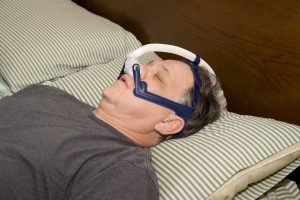
Just over half of the patients had sleep-disordered breathing – including sleep apnea and snoring. During the follow-up, 21 percent of patients with sleep-disordered breathing had major heart events. In those who did not have sleep-disordered breathing, their risk of heart complications was only eight percent.
Those with sleep-disordered breathing also had a higher risk of death during the follow-up period.
Study author Dr. Toru Mazaki said, “Sleep-disordered breathing, which includes snoring and sleep apnea, has long been recognized as an important risk factor for heart disease. However, there is limited awareness of sleep-disordered breathing among cardiologists who care for PCI [percutaneous coronary intervention] patients.”
Mazaki continued, “Doctors and patients should consider sleep studies [after an angioplasty] to rule out sleep-disordered breathing or take necessary precautions to restore healthy breathing during sleep.”
Treatment for sleep apnea includes wearing a CPAP device while asleep to ensure there is continuous airflow. Dental devices and surgery may be other viable options to treat sleep apnea.
Also, read Bel Marra Health’s article: Sleep apnea prevalence higher in stroke-related brain stem injuries.
Sources:
http://newsroom.heart.org/news/sleep-disorders-may-predict-heart-events-after-angioplasty